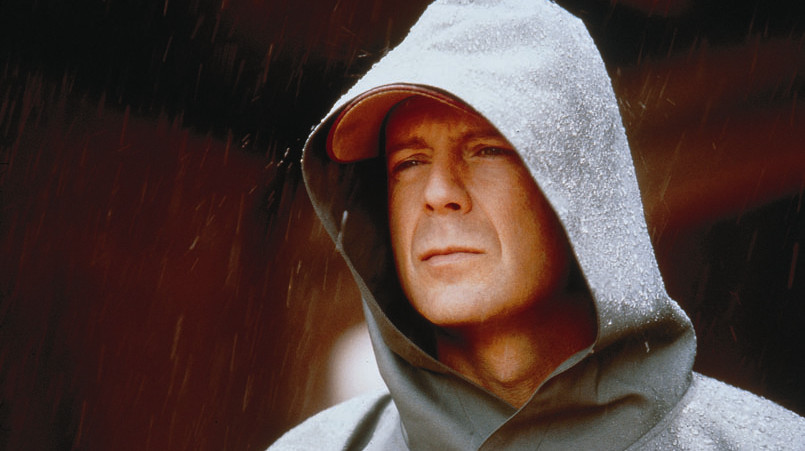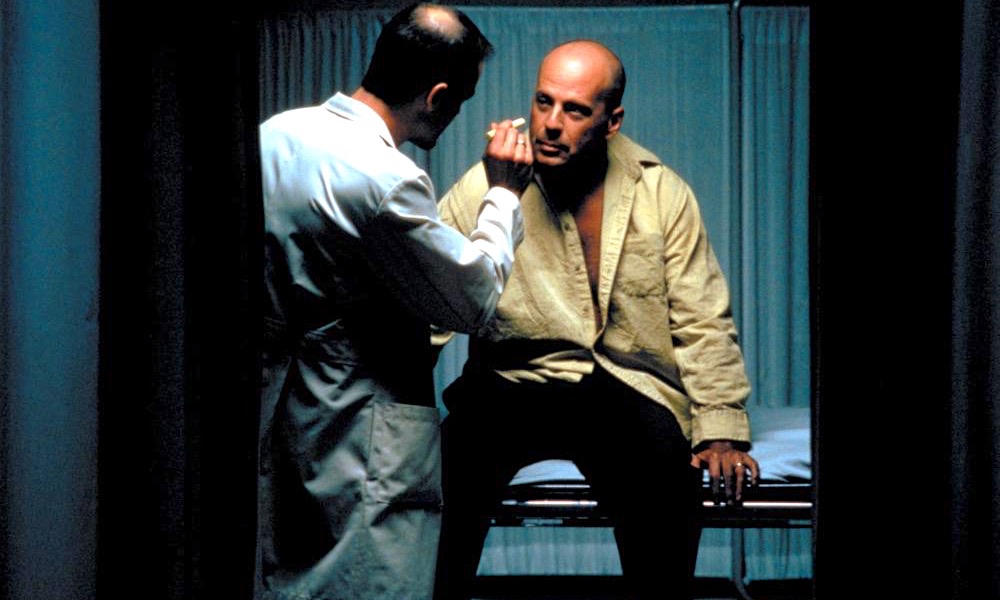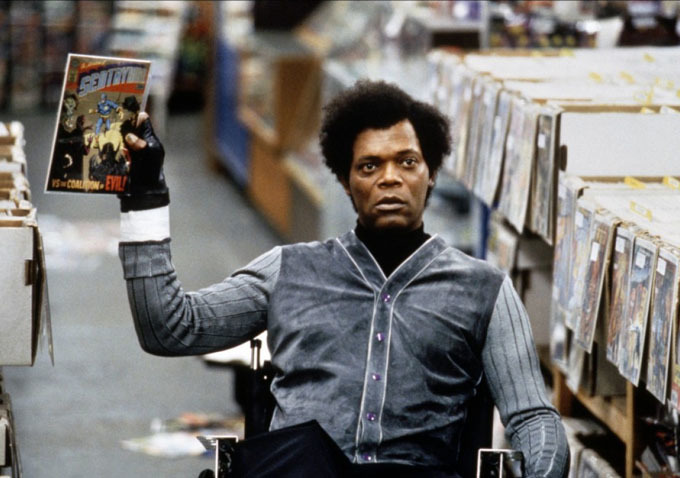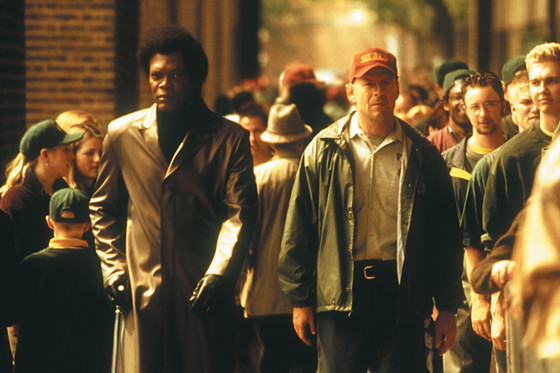
When M. Night Shyamalan became an overnight sensation after making The Sixth Sense, he was able to do whatever he wanted (basically) as a follow-up. He chose the understated superhero/comic book origin story Unbreakable.
Masquerading as a serious drama, Unbreakable took the tropes and beliefs of comic books and plugged them into a story that took place in our world–literally. This wasn’t the heightened version of our world that The Avengers creates. Nor was it the entropic and skewed version of our world that The Dark Knight took place in. No. More than any other other superhero film, this movie took place in reality. Perhaps that is why the film is not so often included in lists of the best comic book movies.
As a consequence of its reliance on realism, the movie travels at a much slower pace than the majority of superhero movies. Likewise, because it doesn’t feature a “big bad” or any big set pieces, it defies traditional comic book structure, focusing its entire running time on what other genre movies would roll through in half an hour.
And, on top of all of that, Shyamalan was following up one of the biggest surprise smash hits EVER. All of this led to an underwhelming box office performance and a feeling for many that Unbreakable was not a success. (The Sixth Sense had made $293 million; Unbreakable made $95 million. Unbreakable’s Rotten Tomatoes score is 68% and its Metacritic score is 62.)
However, time has been kind to the film. With a confident script, brilliant music, gorgeous cinematography, and stellar performances, the movie is a marvel of assured moviemaking. More than that, though, the movie is much better than it is given credit for. It resonates more than almost any other comic book-inflected movie and it treats its audience as intelligent, insightful people. Below are seven reasons that Unbreakable is the single most underrated superhero movie of all time.
1. The most realistic depiction of a superhero ever put on film

Though this is mostly covered above, it deserves fleshing out. Since Unbreakable was released in 2000, there has been a comic book renaissance (or inundation, depending on your perspective). With Christopher Nolan’s Dark Knight trilogy and the ubiquity of the Marvel Cinematic Universe, superhero movies have been trending–generally speaking–more towards realism, striving to create a world around the heroes that looks remarkably like our own.
These movies help the audience to suspend their disbelief far more easily than some that came before. Unbreakable goes one step further, taking every single thing about the movie as seriously as possible. Our hero, David Dunn, has a job as a security guard and a family life. The man who unlocks David’s potential, Elijah Price, is an art gallery owner whose gallery specializes in comic book art.
These men meet each other in an office. David used to play football but, after getting in a car accident, left the game for good. When David must face off against a criminal at the end of the story, there are no spaceships, no indestructible shields, no iron suits, and no overwhelmingly magical abilities.
This is not to suggest that Unbreakable is better simply because it is more realistic. However, the trick that Shyamalan pulled off of crafting a superhero who lives perfectly in our world had never been achieved to quite this degree. Not only does it turn people off who are fans of the more garish and improbable comic book heroes, but it often precludes people from even including it in the same category, which is a travesty.
2. Comic books play a legitimately important role in the plot

One important aspect in creating the realism mentioned above is that comic books exist in the world of Unbreakable (which is not at all unprecedented, being referenced in several other movies, but usually for comedic purposes or in passing). Not only do they exist, but they fuel the plot.
In Logan, the audience saw Hugh Jackman’s character derisively sneer at the comic book he saw and it was a funny moment. It did play into the plot in a small way, inciting the mutant children to find a safe haven where they might live peacefully. In Unbreakable, though, Elijah Price’s life has found meaning through comic books.
Unlike many other comic book films, where celluloid life is given to childhood heroes, this movie imagines that comic books are, in fact, a distortion of a long-ago lost truth: some people were put on this earth to protect the rest of us. Comic books, then, become a reflection of real life and the movie is restoring our proper perspective. To imbue comic books with a greater depth and a resonance is very difficult to do.
With other comic book movies, viewers are able to find universal themes (the X-Men help us sort through various thoughts about discrimination, the Avengers can teach us–at their most basic level–about the power of teamwork, and Superman helps us work through our feelings of loneliness and isolation); Unbreakable strips away the lens through which we are viewing superhero films and informs us that they could actually be real life.
Its theme of finding your destiny is profound, yes, but what other comic book movies abandon all metaphorical pretense and make the audience approach them literally? None. Except Unbreakable.
3. No silly costumes

Though comic books have a strong tradition of superhero costumes, they can sometimes be distracting. Not only do people judge the costumes for their aesthetic qualities, but they immediately give the characters a feeling that they exist somewhere other than where the audience exists. Shyamalan removed that measure of distance from his production design, which therefore removed the characters’ immediate association with comic books. However, it is not that Shyamalan abandoned costumes altogether.
In keeping with the aforementioned realism, Shyamalan and his production designer, Larry Fulton, subtly introduce the idea of “heroic costumes” into the film. Here, it is a function of what each character does and who they are.
While other superhero movies would argue that their costumes function in the same way, that is not quite accurate. In most other comic book movies, the costumes are created by characters within the plot to show that they are heroes and to proudly proclaim some aspect of their personality or powers.
In Unbreakable, the “costumes” are everyday clothes that the characters wear that end up evoking the idea of a traditional superhero costume. Once again, the movie plays with the audience’s perception of what a comic book movie even is.
Bruce Willis’ character, David Dunn, wears his security guard uniform in a climactic scene. He wears it because it is raining and because it is a part of his identity. But the poncho-like jacket looks like a hood and cape late in the film, reminding the audience that Dunn is realizing his latent destiny, as a real hero in our real world. Be seamlessly incorporating those elements while eschewing cliches, Unbreakable once again bucks trends in an interesting way.